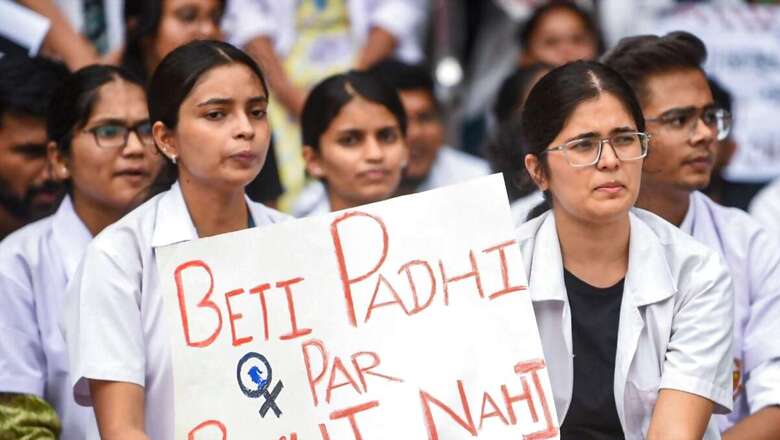
views
After this fortnight, it is not hard to see why some are demanding speedy punishment, including automatic death sentences for severe crimes against women. To put it bluntly, the Indian State is letting rapists get away with their crimes against both grown women and, tragically, little girls. This is a blot on humanity. There needs to be recourse. There has to be a severe deterrent, and men should quake in fear at the prospect of instant, severe retribution.
The cry of anguish began with the extraordinarily brutal rape (suspected gang rape) and murder of a 31-year-old trainee doctor at RG Kar Medical College and Hospital in Kolkata on 9 August 2024. As information emerged, it became clear that she had also been severely tortured before being smothered to death. Rumours suggest that she had stood up to some influential individuals, and this may have been her “punishment."
The immediate parallel was with the gruesome rape and murder of Girija Tickoo in 1990 in Jammu and Kashmir, where she was gang-raped and then sliced alive in two, screaming in mortal pain, on a mechanical saw.
Then there was the 2011 case of Soumya, a 23-year-old travelling in an empty women-only coach on a train in Kerala. She was chased around the coach by a one-armed vagrant named Charlie Thomas, alias Govindachami, who repeatedly bashed her head against the walls. He then pushed her off the train, raped her, and beat her head in with a stone. The lower courts sentenced Charlie to death, but the Supreme Court later commuted it to life imprisonment.
Not about sexual crime, but about power over women
This is not merely about a sexual crime; it is about something far more vile and reptilian. It is about sadistically inflicting pain and humiliation, dominating women, and exerting power over them. It is extreme misogyny, driven by pure hatred, possibly with the intent to send a message.
The rape and murder of a 23-year-old paramedical student, who came to be known as ‘Nirbhaya,’ in 2012 in Delhi, was similarly traumatic. Four of her assailants were executed after seven years, and one killed himself in jail, but the worst offender, who instigated the ramming of an iron rod into her genitals, was released in 2015 on the flimsy grounds that he was allegedly a juvenile. Delhi Chief Minister Arvind Kejriwal presented a sewing machine to the offender upon his release.
There was also the 2016 case of Jisha, a 30-year-old law student in Kerala who was subjected to extreme violence, including disembowelment during her rape and murder. A migrant labourer was charged with the crime and sentenced to death, a verdict upheld by the Kerala High Court in May 2024. However, rumours persist that Jisha was the illegitimate daughter of a local bigwig and that she was “punished" for demanding a share in his property.
In Kerala again, there was the case of the Walayar sisters, a 13-year-old and a 9-year-old, who were found hanging. Their deaths occurred two months apart in 2017. The initial conclusion was suicide, but an uproar followed after postmortems confirmed sexual assault. Several politically connected people who were involved were acquitted by the POCSO court. However, the Kerala High Court ordered a retrial of the five accused, including a juvenile. Currently, the case is with the CBI.
“Every sinner has a future"
There was the startling “every sinner has a future" Supreme Court verdict of 2022, which commuted the death sentence of a rapist-murderer of a four-year-old child to 20 years’ imprisonment. The court also ruled that this was not a “rarest of the rare" case. Using this “every sinner has a future" precedent, the Odisha High Court in May 2024 also commuted the sentence of a rapist-murderer of a six-year-old child. He had been on death row, but the sentence was reduced to life imprisonment. In India, life imprisonment typically means the convict will be released after 14 years, so that is the total sentence the murderer will serve in practice.
On August 20 came another shocker. After 32 years, a POCSO court convicted six men in Ajmer of raping, molesting, photographing, and blackmailing over a hundred minor girls. It took 32 years for what should have been an open-and-shut case. The assailants are said to have political connections with a particular party.
Soft on crimes against women and girls?
All this signals that the Indian State, especially the judiciary, is soft on horrific crimes against women and girls. This cannot continue in a civilised nation. One possible outcome is that the Executive and the Judiciary will take cognisance of these lapses and provide severe deterrence, which can only come with fast-tracking these cases and enforcing capital punishment, rather than offering vague homilies quoting Oscar Wilde.
Another possibility is vigilante justice. The 1974 film Death Wish depicted an unassuming architect in New York who takes the law into his own hands after his wife is murdered and his daughter raped by violent criminals. He stalks muggers and criminals. Ordinary citizens in India may be tempted to do the same.
Copycat crimes, particularly against babies and toddlers, are becoming more frequent. In November 2023, a two-and-a-half-year-old girl was raped by a 17-year-old boy in Buldhana, Maharashtra. In August 2024, a Class 9 student was detained for allegedly raping a three-year-old girl in Mumbai.
This sort of thing simply cannot continue. It is not the case that India is particularly prone to sexual crimes against women—the number of reported rapes is not high compared to other countries—but for a nation that calls itself the Motherland and worships many female deities, the cavalier treatment of crimes against women is a disgrace and must be stopped.
The writer has been a conservative columnist for over 25 years. His academic interest is innovation. Views expressed in the above piece are personal and solely that of the author. They do not necessarily reflect News18’s views.














Comments
0 comment